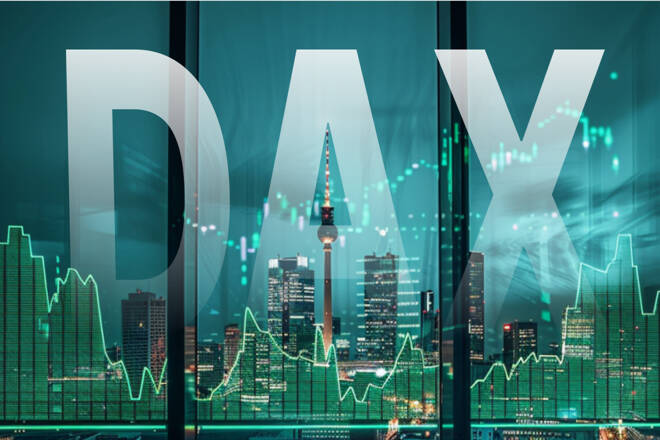Advertisement
Advertisement
Dax Index News: Geopolitical Easing Fuels Gains; Eyes on ECB and US Data Today
By:
Key Points:
- DAX gains 0.43%, driven by easing geopolitical risks and ECB rate cut expectations, closing at 19,405 on Monday.
- German Ifo Business Sentiment Index falls to 85.7, fueling fears of a recession and dovish ECB policy expectations.
- US tariff threat on EU goods remains a headwind for the DAX.
DAX Extends Winning Streak on Easing Geopolitical Risks
The DAX advanced by 0.43% on Monday, November 25, following Friday’s gain of 0.92%, closing at 19,405.
Easing Middle East tensions, positive sentiment around Scott Bessent’s nomination as US Treasury Secretary, and expectations of ECB rate cuts boosted investor sentiment. However, concerns over new tariff threats limited the upside.
Sector Highlights: Autos, Retail, and Tech Lead
Porsche Preferred Stock advanced by 2.77%, while BMW gained 2.21%. Positive sentiment also drove Mercedes Benz Group and Volkswagen higher.
Retail stocks also performed well, with Adidas jumping 3.17% and Zalando gaining 1.22%.
Meanwhile, Commerzbank plunged 5.02% as UniCredit’s potential acquisition of Banco BPM fueled uncertainty about Commerzbank’s bid.
German Business Sentiment Wanes
The Ifo Business Sentiment Index declined from 86.5 in October to 85.7 in November. Weaker business sentiment could hurt the labor market and consumer spending. A downward trend in consumer spending may dampen demand-driven inflation, potentially supporting a more dovish ECB rate path.
Oxford Economics European Macroeconomic specialist Daniel Kral reacted to the Ifo Business Sentiment figures, stating,
“Renewed recession fears in Germany as Ifo falls today, compounding weak PMIs from last week. But the historic relationship with GDP has broken since the Ukraine war with respondents much gloomier than actual performance. Direction of travel not good though…”
US Economic Indicators Send Mixed Signals
On Monday, the Chicago Fed National Activity Index unexpectedly dropped in November, while the Dallas Fed Manufacturing Index moved slightly higher. The Dallas Fed figures drew more interest, supporting the US markets and indirectly benefitting the DAX.
US Equity Markets Extend Gains Amid Fresh Tariff Threats
On Monday, November 25, US equity markets extended their gains from Friday. The Nasdaq Composite Index rose 0.27%, the S&P 500 gained 0.30%, and the Dow rallied 0.99%.
Early gains across the US markets boosted demand for DAX-listed stocks. However, threats of US tariffs on Mexico, China, and Canada capped the gains for the DAX. The potential for US tariffs on EU goods remains a headwind for the DAX.
US Consumer Confidence and the Fed
Looking ahead to Tuesday’s US session, the CB Consumer Confidence Index could influence the Fed rate path. Economists forecast the Index to increase from 108.7 in October to 111.6 in November. Improving confidence could signal a pickup in consumer spending and demand-driven inflation. A higher inflation outlook may dampen bets on a December Fed rate cut.
Other US economic indicators include housing sector data. However, the consumer confidence figure will likely impact the DAX more.
Near-Term Outlook
In the near term, DAX movements will hinge on geopolitical developments, US data, and central bank commentary. Soft US data, a Middle East ceasefire, and a dovish ECB rate path could push the DAX toward its all-time high of 19,675. Conversely, the DAX may fall toward 19,000 on better-than-expected US economic indicators, and the ECB cautions against a 50 bps rate cut.
As of Tuesday morning, futures signaled a choppy session. DAX futures slid by 120 points, while the Nasdaq mini futures were up 17 points.
Investors should closely monitor US data releases and geopolitical developments for potential trading opportunities in the DAX.
DAX Technical Indicators
Daily Chart
After Monday’s gains, the DAX sits above the 50-day and 200-day EMAs, confirming bullish price trends.
A DAX return to 19,500 could signal a move toward the all-time high of 19,675. Furthermore, a break above 19,675 may enable the bulls to target 19,750.
Key drivers include US economic indicators, news from the Middle East, US tariff chatter, and central bank commentary.
Conversely, a DAX drop below 19,350 could test the 50-day EMA. A fall through the 50-day EMA may enable the bears to target 19,000.
With the 14-day RSI at 55.36, the DAX may move above the 19,675 all-time high before entering overbought territory.
About the Author
Bob Masonauthor
With over 28 years of experience in the financial industry, Bob has worked with various global rating agencies and multinational banks. Currently he is covering currencies, commodities, alternative asset classes and global equities, focusing mostly on European and Asian markets.
Advertisement
